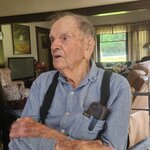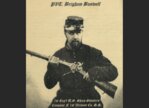

Don Buswell, a centenarian from Toledo, years ago visited the East Coast Civil War battlefields and stood in awe at one near Richmond, Virginia, where his grandfather Brigham Buswell was shot in the arm and hip while fighting with Hiram C. Berdan’s Sharp Shooters.
“It was just a little hump,” he said of Malvern Hill, which he’d read about in his grandfather’s diary. “I tell you, talk about a funny feeling, to stand right there, and I know I was within 50 feet of where it happened to him.”
He said his grandfather became an alcoholic because that was the only anesthetic offered to numb the pain of his wounds. But he quit drinking before leaving Nebraska.
“He told my dad that he would walk down the middle of the street instead of the sidewalk ‘so I wouldn’t be tempted to go in the bars,’” said Don, who met his grandfather only a couple of times before he died in Seattle in 1942, just before his 100th birthday. Don attended his 95th birthday party.
The Buswell family arrived in Toledo in a roundabout way from Nebraska, where Brigham initially settled and raised his family until his first wife and many of his seven children died. He married his second wife, Altha, and they later moved to Elma, Washington, where Brigham worked as a pharmacist and raised another seven children.
In 1914, their son Wallace Eugene Buswell, who was born on Jan. 13, 1891, in Gosper County, Nebraska, left Elma to seek his fortune prospecting for gold in Canada’s Yukon Territory. He worked his way north on a riverboat and mined for gold at Ester Creek near Fairbanks in what later became the state of Alaska. Miners had to bore through frozen ice to bedrock, so they used a boiler with steam to melt the ice. Don’s father, Wallace, said the mining operation had two retired sled dogs, a male and female, named Brandy and Whiskey.
“He said the female was practically immobilized, and she got to stay in the boiler room,” Don recalled. “Brandy would go up to the cookhouse, get food, and bring it back. Isn’t that something? Oh, I’ll never forget that.”
Wallace worked at the Ester Creek mine with a partner, Sigwald Borlond, sinking a shaft near the Golden Eagle Hotel. Then he met the love of his life, an immigrant named Ina Wilhelmina Ahonen, who was born on May 29, 1893, in Helsinki, Finland, to Einar and Wilhelmina Henricksdotter Linna Ahonen. In 1913, she immigrated alone to North America, crossed the continent, and spent several weeks in Seattle before traveling by steamer to Alaska to live with her aunt — all without speaking English. But she quickly learned the language and later spoke with scarcely any accent.
“Grandpa told me he married her because she was the only honest woman in town,” said Don’s son, Guy, a retired Toledo High School industrial arts teacher.
On June 2, 1915, a Presbyterian minister married Wallace and Ina (Ahonen) Buswell at a private home in the presence of intimate friends, including witnesses Borlond and Helen Launo.
Before long, Ina became pregnant with their first child.
“My oldest sister was almost born on a dog sled,” Don said. “He was taking her to the hospital on a dog sled, and it was a beautiful night. He said her water even broke on the dog sled.”
That night they saw many snowshoe hares, which his parents hunted for meat. “I’ll never forget him tellin’ us about it. The snowshoe hares were all over, and she was sic’ing the dogs on them. He could hardly control them, trying to get to the hospital.”
For Don and his five siblings, dubbed the “Big Six,” the best form of entertainment was his parents “telling us stories and singing to us.”
Two of the children were born in Alaska — Ina Ellen in 1916 and Wilma Esther in 1917.
About that time, the United States entered World War I, and Wallace registered for the draft. His paperwork described him as a tall man of medium build with black hair and brown eyes.
With a stake of $6,000 — more than $140,000 in today’s dollars — and a pocket filled with several gold nuggets, Wallace and Ina with their two children left Alaska for Oregon, where they lived in Portland for a few years, long enough to have two more children — Nelma Wilhelmina in 1918 and Anor Eugene in 1919.
But Wallace wanted to farm, so the family of six moved north to Lewis County, where he purchased 200 acres three miles south of Toledo on Pacific Highway, also known as Old Highway 99.
“The first thing he did was build this house and the barn, which I suppose took all that grubstake,” Don said.
Wallace hired a Finnish carpenter to build a farmhouse almost entirely by hand and made monthly payments of $75 to purchase the land. He paid off his bank note in 1940.
In a back bedroom of the farmhouse, which still stands on Jackson Highway, Ina gave birth to Donald Wallace Buswell on Aug. 30, 1922, with help from a midwife two houses up the road. “I was almost born in a sauna bath,” he said. “That’s the first thing Dad built when he moved here with to the farm.”
Ina’s last child, Hazel Marie, was born in 1925.
Don still sleeps in the bedroom where he was born.
“We had no radio,” he said. “We didn’t even have electricity here in this house.”
His earliest memory is the first day of school, when his mother sent him up the road to the one-room O.K. School with his older siblings, warning him to watch for cars.
“In those days, lady teachers in this country school were required to be single,” he said. Don recalled his first teacher, Miss Pavell. “She was a pretty woman, I remember that. Slender and pretty.”
On the first day of class, the teacher promoted him to second grade because he could read, write and count, thanks to his older sisters.
He walked home and arrived sicker than a dog. His mother told him to lie down, uncertain what ailed her youngest son—until she smelled his breath.
“I was shooting cigarette snipes off and smoking them on the way home,” he said. Snipes were partially smoked cigarettes tossed into ditches by people in passing cars.
For two years, Don attended the O.K. School, which had trouble with its well. The teacher sent a kid with a bucket down to the Buswell farm to haul back drinking water.
Then, in the late 1920s, all the rural one-room schools were consolidated into school districts with buses collecting students and hauling them into towns.
Like most children growing up on farms, Don and his siblings learned early how to work hard, milking eight or 10 cows, feeding chickens, cleaning the barns and chicken coops, separating the cream from the milk, and later haying, clearing land, tending the garden, cutting wood, hauling manure and building fences. He enjoyed the communal threshing of wheat as many neighbors worked together.
Don described his as “a wonderful family.” The six children, all born within eight years, played together, roamed the woods, swam in the Cowlitz River and visited neighbors for coffee, cake and conversation.
“We didn’t have any toys whatsoever,” he recalled. “We played ball. We made our own ball. We had to wrap up rags. We had a great childhood.”
Occasionally, they’d pay a nickel each to watch silent movies at the Toledo theater, where the older siblings would read the captions to the younger ones.
At Toledo High School, Don played a bit of baseball and football, but as one of the youngest kids in his class, he said he didn’t do well.
“We only had two hours of practice a week,” he said. “That was our P.E. period. There was no transportation.”
Only two students drove cars to school — Toad Washburn, who also operated the school bus, and a student from Winlock whose father owned the Chevrolet dealership. Don’s family owned a Model T and later a pickup for hauling eggs to the Co-op in Winlock. Don and his siblings borrowed it at times.
Don, who performed in class plays, including “Cat O’ Nine Tails,” said Toad did, too, even though he had only one line.
“The reason he turned out for the play — he got to come to play practice at night. We’d usually party a little afterward,” Don said. “He had one line, I forgot what that one line was, but he never missed the play practice.”
Dave Anderson was the principal, he said, and teacher Albert Kletsch, who had never played football, coached the team. “He was a good teacher,” Don said. As for coaching football? “He didn’t know siccum.”
“The high school only had two baseballs,” he said. “If someone knocked a foul way out, you gotta wait till he came back in to keep the game going.”
Don participated in Future Farmers of America (FFA), and the Toledo FFA students in 1939 camped their way down to the World’s Fair in San Francisco, also known as the Golden Gate International Exposition. He recalled famous burlesque entertainers and strippers like Gypsy Rose Lee beckoned to the boys to enter a tent. He didn’t recall accepting the invitation.
“I only had $10,” he said. “Boy, by the time I was home, I got hungry.”
The year before, in 1938, the FFA kids traveled to Yellowstone, but Don couldn’t go because he had appendicitis. His brother, Anor, filled him in on the trip, especially camping in Eastern Washington with a naïve student who was given a flashlight, a sack, and orders to catch a snipe by enticing it with an engaging “Coo-ey, coo-ey.”
“They’re all laughing about the time a state cop happened to stop by and see what was going on,” Don said. “So this Bud Kalich told the cop, and that cop went out there and told the kid he was hunting snipe out of season. Scared that poor kid to death.”
•••
Julie McDonald, a personal historian from Toledo, may be reached at memoirs@chaptersoflife.com.